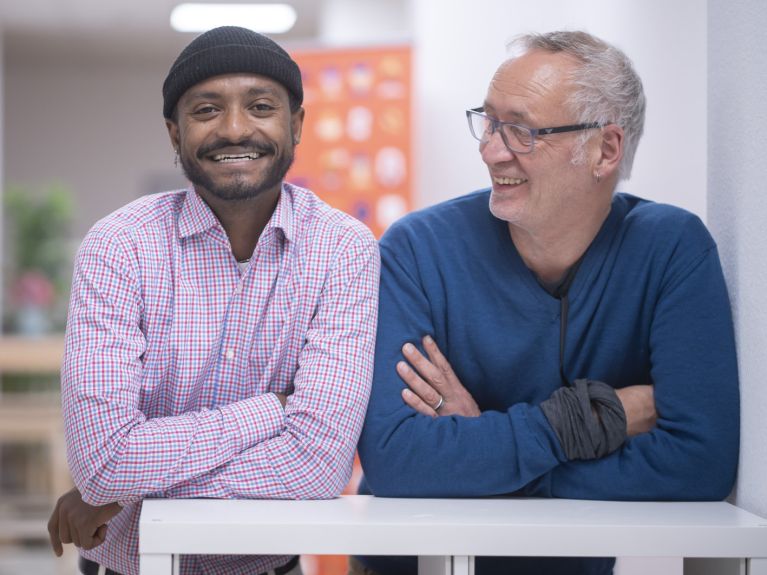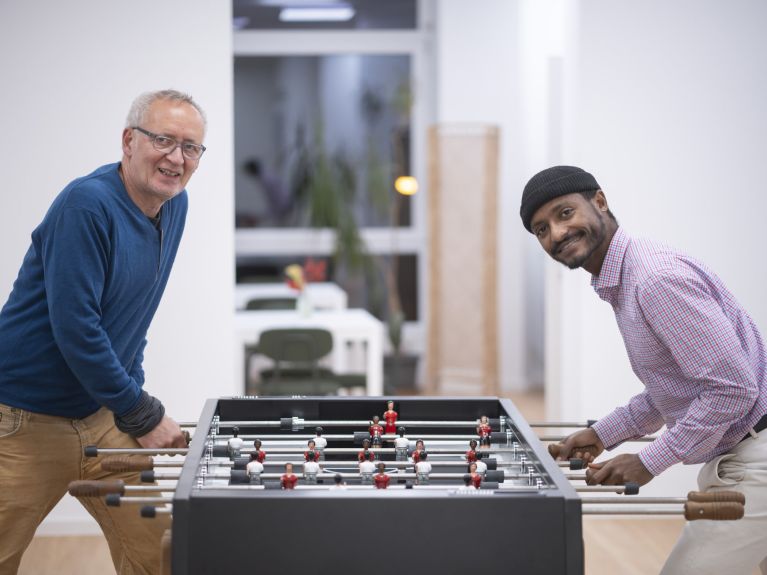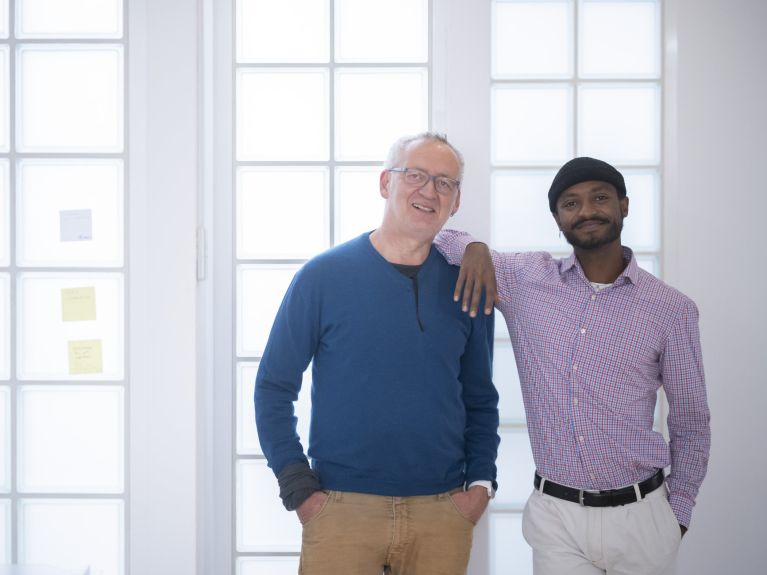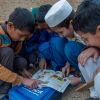Fresh perspectives for young refugees
Side by side: the Frankfurt Child Protection Association’s “Volunteer Guardianships” project provides support and prospects.

Faris came to Germany from Sudan at the age of 17 as an unaccompanied refugee and was supported by volunteer guardian Volker Kaltschnee: trained by the Frankfurt Child Protection Association, Kaltschnee helped Faris settle into day-to-day life in his new home. In this interview, the two talk about the special bond between them and how they both benefited from the experience.
Faris, you have Eritrean roots and came to Germany at the age of 17 as an unaccompanied refugee from Sudan. How did you find this initial period and how did Volker Kaltschnee support you as a volunteer guardian?
It was a challenging time. It’s difficult to gain a foothold in a new country without guidance. Volker was a great help as a volunteer guardian. He supported me in so many ways: when it came to clarifying my residence status, at school, and also later in pursuing a career. There were often bureaucratic hurdles. Volker was always at my side – as a mentor on a personal level, too, when it came to dealing with stressful situations, for instance.
Mr Kaltschnee, why did you want to take on a voluntary guardianship?
A lot of young people came to Germany in 2015 as a result of the Syrian war, and I realised that there was a lack of support for them in every respect. I wanted to make my contribution to giving these young people a real chance to grow into our society. Working with Faris taught me a lot – especially about perseverance, different cultural perspectives, and the importance of openness and trust in any relationship. It was enriching to experience his development and be at his side for a while. His positive outlook and determination never ceased to impress and inspire me.

Your relationship with each other seems very trusting, respectful and close.
Volker Kaltschnee: We quickly realised that we had a similar sense of humour, so we hit it off straight away. And although Faris is from a different culture, it clicked between us right away on a personal level. Faris kept telling me about what he’d experienced and the challenges he faced on his way to a new life in Germany. These were often intense conversations, and a trusting relationship developed over the years.
Faris: It was important to me to be able to trust him and for him to provide me with guidance – both culturally and on a personal level. I knew I could count on him. That gave me a lot of strength in difficult moments.
Faris, how did your career development in Germany continue?
I learnt the language first, that was the basis. Later I did an internship as a dental technician and then started an apprenticeship. I’ve now been working as a dental technician for four years, and I’ve started my further training to become a master dental technician.

Mr Kaltschnee, how do you feel when you look back on how Faris’ career has developed?
I’m very proud of him. His trajectory shows that integration works well providing young people who’ve suffered displacement are given the right support. Faris is successful in his job and a valuable member of our society as an individual. His success story makes me feel that I did the right thing at the right time.
Faris, today you lead an independent life in Germany. What does that mean for you?
I feel I’ve arrived and can lead a “normal” everyday life. Volker helped me find my bearings and build a life of my own. Now I’m like everyone else here and get annoyed about things like trains not being on time or the weather. I don’t have existential fears any more. That shows how far I’ve come.
The “Volunteer Guardianships” project
Unaccompanied underage refugees in Germany need a guardian who represents them legally, makes important decisions regarding their welfare and supports them through the asylum process and in their day-to-day lives.
Through its “Volunteer Guardianships” project set up in 2013, the Frankfurt Child Protection Association provides guardians for children whose parents have been deprived of custody or who have fled to Germany on their own. More than 260 volunteers have been trained, and more than 250 children and young people – known as “wards” – from 30 nations have been assigned a guardian. The volunteers act as a parent-like figure, supporting the children and young people in all decisions and bureaucratic matters of everyday life. They go through an intense training programme and are themselves provided with support so that they can act not just as legal mentors to the youngsters but also as personal mentors.
The guardianship ends as soon as the ward turns 18. The “Careleaver Mentoring” project is run by the Frankfurt Child Protection Association to help young adults transition to an independent life with a volunteer mentor.


